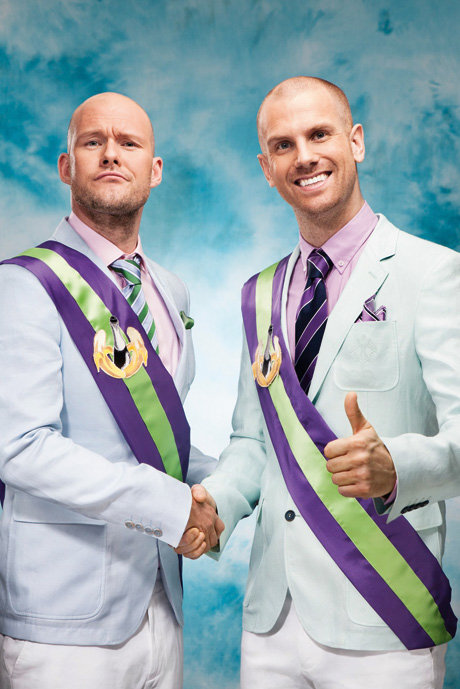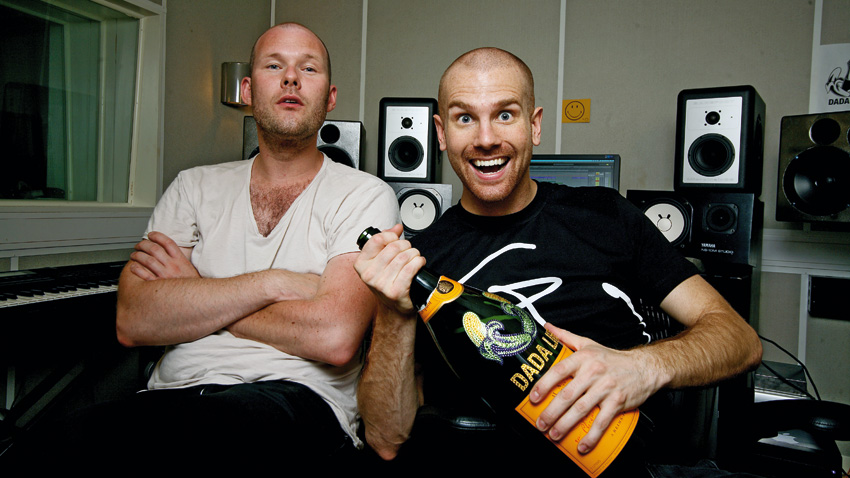Dada Life talk sound, science and sausage
We catch up with one half of the Swedish production pair and madcap plugin merchants to learn more about the secret 'Rules of Dada'

"I've always loved techno and electronic music, but I could never understand why people seemed to take it all so damned seriously," says Stefan Engblom, the techie half of Swedish duo Dada Life. "Luckily, things have changed now, but there was a time when all the DJs were wearing sunglasses and trying to be cool; on stage, they stood like they'd got a big stick up their ass. I guess Dada Life was created as an alternative to all those cool guys. Do we take our music seriously? Yes. Do we take ourselves seriously? Hell, no!"
Stockholm-based Engblom and his musical other-half, Olle Cornéer, have been doing battle with the cool guys for the best part of ten years now. Their bouncing debut, Big Time, was released in back in 2006, but it was the dayglo insistence of Kick Out The Epic Motherfucker (2011) that cemented their reputation as clubland's class clowns.
"We dress up on stage, we ask for champagne and bananas on our backstage rider, and we even managed to hold the world's biggest pillow fight at one of our gigs. Almost 4000 people beating each other over the head with pillows! Man, it was pretty wild!
"We still put a lot of effort and attention to detail into our music, and we think that we've created some great tunes, but we also want to have fun. The best music always puts a smile on your face."

Dada Life's brand of organised chaos hasn't always gone down well with the club purists, has it? Does that bother you?
"No. As far as I'm concerned, there's different music for different people. When I was a little kid, music was my saviour. I was full of energy, always jumping around. Then, at about seven years old, I discovered happy hardcore. At about 180bpm, the music seemed to absorb my craziness. The music made me feel alive!
"I am moving ahead five years here, but when it came to making my own tunes, I wanted to create that same atmosphere. I wanted to feel the energy, and I wanted to feel alive."
Want all the hottest music and gear news, reviews, deals, features and more, direct to your inbox? Sign up here.
So, you made your first tune at 12?
"Well, maybe 12 or 13. I was a computer geek; a full-time nerd. I had a Commodore 64, worshipped MS-DOS, read every maths book I could find, and when I finally discovered the early tracker software, I realised I was in heaven.
"Obviously, I didn't have any money to buy synthesisers or drum machines, but I could program my computer to make noises. Wow! I could not believe it. Today's 12 year-olds might find this very hard to understand - all they have to do is open up GarageBand - but using your computer to make music back then was absolutely insane.
"Musically, I had no training at all: I couldn't play an instrument; I didn't know about chords or scales. When I wrote my first tune, it was a completely random process. There were no notes - it was just hexadecimal. If I typed in 'C', it sounded different to 'F'. I didn't know why it sounded right, but my logical mind soon worked out what was happening, which allowed me to create music.
"For a maths and computer geek like me, writing music was like solving an equation. OK, I do A, B with a bit of C, and end up with D. It's hard to put myself back into that teenage mindset, but it felt like I was making up my own musical rules. Scientific rules. I was gathering all the empirical data at my disposal, trying to write a song.
" There were no notes - it was just hexadecimal. If I typed in 'C', it sounded different to 'F'. I didn't know why it sounded right, but my logical mind soon worked out what was happening, which allowed me to create music."
"And you know what? It sounded completely shit! [Laughs]. It was awful. But that didn't matter. What mattered was that I could call my parents into my bedroom and say, 'I have made this.'
"Do you guys remember the SoundBlaster 8-bit card? That was the soundcard in my computer. One Christmas, I asked my parents if I could have the AWE32. Christmas morning came, and there it was. All my friends got bikes, Transformer toys and skateboards, but I got this… card. I remember my dad saying, 'Here you go, son. Here's this strange thing you asked for'. I thought that as soon as I got it, all my music would sound like a professional CD. I was in for a big surprise!"
Musicians often talk about feel and soul… it's not often we hear them waxing lyrical about empirical data!
"I have a very logical brain. Sometimes it can help, but sometimes it's a weakness because you start thinking too much. When I'm in those moods, making music is like looking for a result - an answer - where everything is perfect.
"In music, you don't get that. Songs are never perfect because they're never technically finished. This is especially true when you're working on a modern, computer-based setup. There are infinite possibilities… you can add more and more and do another mix and another. My brain always wants to go further in that search for perfection. Thank God, Olle is the opposite of me. He is a trained musician and he can play anything, but he also moves very fast. Bang-bang, that track is finished, let's move on.
"Of course, like all musicians, he also likes to write very complicated melodies and chord structures, but that's when my logical personality comes to the rescue. If I'm getting lost in a song, then I know the listener will. That's when I tell Olle, 'We have to simplify things'. The two of us together is a great combination."
Where did you go after the tracker years, and what's today's setup?
"Bizarrely, I managed to get a sort of record deal when I was about 16, and the company bought me a big Mac loaded up with an early version of Logic. I opened up the ES1 and realised I was staring at the future. There was no synthesiser in my room, but brilliant synth sounds were coming out of my speakers. I still get goosebumps thinking about that one moment.
"I bought some outboard gear as well - a Nord Lead, a mixing desk, a reverb - because the computers simply didn't have enough power to let you run much in Logic. But the rate of change just began to race ahead, and it wasn't long before all the hardware had been sold.
"Ironically, we all seem to be buying it back, don't we? Searching the second-hand shops for 808s and vintage synths. We've actually just bought a Moog Voyager, and we spent the whole of yesterday playing with it. Anyone who listened at the studio door must have wondered what was happening, because we were laughing our heads off."
And you're still with Logic?
"After I met Olle, I stayed with Logic for a long time, but when Ableton arrived, it seemed like an interesting new way of working, so we tried it. We liked the newness, so we made the switch.
"The one thing that really lets Ableton down is the latency compensation. It's not working and they know it's not working, but it's become such a problem that we started looking at Bitwig. We are actually beta testers for Bitwig, but the sad fact is that I am nowhere near as quick on Bitwig as I am on Ableton. Ableton is in my fingers - it's in my soul. I don't have to think how to use it.
"Bitwig is like a completely new language for me, and that's going to take a long time to learn. All you need to lose is half a second here and there while you're working on a song and, suddenly, the idea has gone. I keep trying to make tracks in Bitwig, but things that take an hour will only take ten minutes in Ableton, which is really frustrating.
"Ableton is a great program, but if I was a young kid, coming to production with no baggage, I would definitely go with Bitwig."

You mentioned the Moog Voyager earlier. Synth-wise, is there a lot of hardware in your studio?
"We have got some nice hardware, but our sounds mainly come from software. Nexus2 has got some great presets, but I've never been so keen on letting it stand on its own in a mix. Usually, it will fill out a sound that's already there, adding a bit of body or width.
"The Ableton collection isn't too bad. Operator is great for basses and can certainly hold its own against Massive or Sylenth. To be honest, though, we're big fans of Native Instruments. I don't know what those guys do that is so good, but… maybe it's the quality of the sounds or usability of a synth like Massive. And let's not forget Razor, too.
"Actually, here's my theory of why they're so good - I'm not an expert on this, so please don't beat me up if I'm wrong. Native Instruments seemed to be one of the first companies that put as much effort into the effects as they did into the presets and the interface. That means you can work within your chosen synth and get exactly the sound you're looking for. With ES1, you've got great presets, but you still have to spend time getting a finished sound.
"Native Instruments' Alicia's Keys pianos have come in very useful, as have the new RC 24 and RC 48 reverbs [Reverb Classics]. The big surprise for us, though, was the quality of the VC series compressors [VC 76, VC 2A and VC 160 emulations]. They are just insane! You've got a software version of the 1176, the LA-2A and a dbx 160, and let me tell you something: they're this close to the real thing. We've got a real 1176 in the studio, and we've compared the two. What they've created is so good, it's completely nuts! Obviously, you don't have to use them on everything - if we just need a bit of sidechaining, Ableton is fine - but when you really need something to sound right, these are definitely worth the money.
"Damn! I almost forgot. Our favourite piece of software in 2015: iZotope's RX 4."
"we're big fans of Native Instruments. I don't know what those guys do that is so good, but… maybe it's the quality of the sounds or usability of a synth like Massive. And let's not forget Razor, too."
Can't imagine many people would have put that at the top of Dada Life's shopping list…
"I know! It's weird how this production tool has managed to work its way into our lives. Take something like a sampled hi-hat. The hat is not quite right, but instead of trying to EQ it, you can stick it in RX 4 and really see what's happening with the sound. Find the bit that's bothering you and get rid of it. There's a precision that you just can't find in a normal EQ. More and more, I find myself loading every sample in there and just doing a little bit of tidying up; turning a good sample into a great sample.
"RX 4's Deconstruct module is amazing on cymbals. You can remove all of those annoying tones and just leave the noise. It still sounds like a crash, but it's not in the way of anything else.
"When I hear a song that I like, the first thing I do now is pull up RX 4. If there's something magic happening, I want to know why it's happening, and the software really allows me to poke around in a song. Always take a look at what's happening below 200Hz, because that's the bit that matters on the dancefloor.
"You see! That's my logical, mathematical brain in action again. I am trying to solve the equation. I find out why a song works and I apply the same rules to our songs. OK, the kick needs a bit more here and a bit less here. Tweak the bassline here. We're talking about minute little changes - things that our Barefoot MicroMain 35 speakers might not even pick up.
"Even in the monitoring department, we have been given some help. The SubPac tactile monitoring system has revolutionised how we listen to music in the studio. I've actually got part of it installed in my studio chair! I can do all the tweaking in RX 4 and, even though my ears might not pick up those changes, my body does. My body tells me it's right.
"Wow! Musically and technically, things are moving so quickly. There is all this power and opportunity at our fingertips! We are living in crazy times, man. Crazy, crazy times. But we love it!"
Finally, tell us about your Sausage Fattener plugin.
"There are always a lot of effects at work in a Dada Life song, but the technique we developed over the years was to use a little bit from each effect to create a much bigger impact in the song. Instead of whacking tons of a single effect like distortion over everything, we add little bits of each different flavour: a bit of EQ, a bit of compression, a bit of dirt. Push each one a small amount, but don't take any of them to extremes.
"And the cool part about Ableton is that you can put that whole effects chain together and stick it on one knob - which is how the Sausage Fattener plugin came about. People used to always ask us about how we got certain effects and how we got the gritty sound, and we realised that it was basically the same set of effects on almost every song. All controlled by the one Ableton knob. So, when Tailored Noise came along and asked us if we were interested in their artist-related plugins, it seemed like a great idea.
"You want to know what's in there, right? Ha! We can't tell you. Sure, we read the forums, and we've seen some of the wild speculation that people have put out there. Some of them have got close, but… sorry, nobody gets the Dada Life cigar!"


Computer Music magazine is the world’s best selling publication dedicated solely to making great music with your Mac or PC computer. Each issue it brings its lucky readers the best in cutting-edge tutorials, need-to-know, expert software reviews and even all the tools you actually need to make great music today, courtesy of our legendary CM Plugin Suite.
